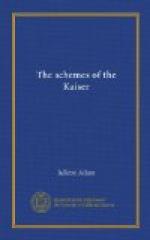Whilst William II was paying his devotions at the Holy Places, giving all the impression of a pious benevolent Head of the Church, a number of horrible evictions were being carried out in Schleswig in his name and by his orders. Hundreds of families, dragged from their native soil, from their homes and kindred, were led away to the frontier on the pretext that they still clung to their belief in a “Southern Jutland.” Day after day, for the last thirty-four years, on one pretext or another—and sometimes without any—the Danes have been discouraged from living in Schleswig. Either life has gradually been made impossible for them, or else they have been suddenly compelled to leave the house where they were born, where their elders hoped to die in peace, and their places have been filled by German colonists. A terrible exodus, shameful cruelty! But “Germany for the Germans” is an axiom before which all must bow, big and little, rich and poor.
December 10, 1898. [15]
Mr. Chamberlain’s coquetting with Germany has ceased for the time being. The Times, in contrast with its former hymns of praise, now contents itself with asking William II not to make difficulties for England in Europe or beyond the seas, and it adds that a friendly attitude would serve the interests of German subjects in the Colonies much better than one of hostility.
The passage in the German Emperor’s Speech from the Throne which refers to China is not calculated, it would seem, to appease Great Britain’s irritation. “Germany’s Colonies,” said the Kaiser, “are in a state of prosperous development. At Kiao-chao steps have already been taken to improve the economic conditions of the protectorate. The frontier has been definitely settled by agreement with the Chinese Government. A free port has been opened and work upon it has begun. The construction of the railway which will link up the Protectorate with the Hinterland, will be commenced in the near future. Relying on the old treaties still in force, and on the new rights acquired under the treaty concluded with China on March 6, 1898, my Government will also endeavour in future, whilst carefully respecting the lawful rights acquired by other Powers, to develop economic relations with China, which, year by year, will become more important, and to secure to German subjects their full share in the activities directed towards opening the Far East to Europe, from the economic point of view.”
Nor is the influence acquired by William II and his subjects in the Ottoman Empire, emphasised by this same Speech from the Throne, of a nature to reassure England with regard to her projects in the East. In the Near, as in the Far, East she sees herself being supplanted by Germany, and this by methods identical with her own, against which, therefore, she fights more disadvantageously than against France and Russia, more foolishly chivalrous.




